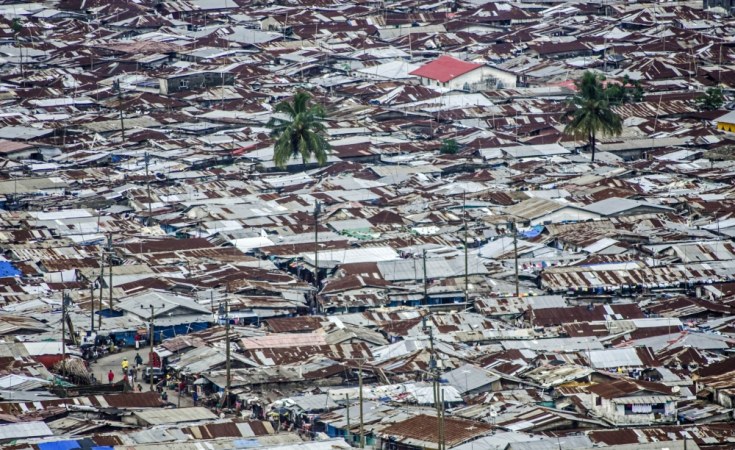Monrovia — You can't walk too far along West Point's main thoroughfare before realizing that life in the slum community is much like it was before the Ebola epidemic made it a battle ground for its tens of thousands of residents.
The densely populated and squalid township, located along the capital city's coastline, was a major flashpoint during the world's worst Ebola outbreak. Aside from environmental degradation, the area is notorious for crime and unemployment.
But when an angry mob broke into a temporary facility for suspected Ebola patients during the early stages of the epidemic, there was widespread shock. In response, President Ellen Johnson Sirleaf ordered that the township be quarantined to prevent the virus from spreading to other parts of the capital. This led to running battles with security forces.
That was almost two years ago. "Most of the people are now going back to their normal way of living," said Nelly Cooper. She is a community leader and head of West Point Women for Health and Development.
The organization worked with several others to help sensitize residents on the dangers and modes of transmission of Ebola. Reacting to the virtual collapse of the country's health system during the crisis, the group also trained scores of women on healthcare delivery to their sick families.
"Looking at West Point being a vulnerable community and very congested, we decided to take matters into our hands" Nelly said. "We couldn't sit by and let our people die." With help from donors, the women's group distributed chlorine, gloves, masks and other protective gear across the neighborhood.
The group recruited hundreds of volunteers to carry out "massive awareness" in various parts of West Point. "It was very hard to get entry at first," Nelly said, "but because of us – who are members of the community – they realized that they had to listen."
Resistance to efforts by Western health workers to help corral the outbreak has been cited as one of the factors that contributed to the disease's rapid spread in the three worst affected countries – Liberia, Guinea and Sierra Leone. But in addition to what the World Health Organization called the "decisive leadership" of President Ellen Johnson Sirleaf and her government, as the enormity of the Ebola threat was realized, it was the less-noticed factor of effective neighborhood engagement that turned the tide.
The campaign by the West Point Women for Health and Development arose in the epicenter where the virus began to explode across a major urban area for the first time in Ebola's history. The group's courageous monitoring, reporting and responding to community concerns contributed to Liberia's success at beating the disease before its neighbors did.
"We had a doctor who gave us regular updates on what we needed to do in order to avoid getting infected" said another volunteer, Grace Yeaneh Mason. With support from the U.S. based Daphne Foundation and other sponsors, her group hired dozens of "field volunteers" to go out and talk to inhabitants, including survivors.
"We identified over 25 survivors in West Point that we worked with and provided support for," Grace said. She acknowledged that it was a challenge for her group to grapple with not just ignorance of the disease, but also stigmatization of those who survived.
"One thing that changed the whole stigma thing was when different institutions started taking care of these survivors," she said. According to Grace, when the community saw how survivors were taken care of, they too became helpful.
But in order for community engagement to happen in earnest, the group had to recruit survivors as volunteers. "Like one of the boys that worked with us, Simpson," Grace said. "He came and went in the field, just to dispel the [negative] notion, and say: Here, someone can get well and get back in the society again.
As time went by, the situation changed drastically [for the better]" A group called the Ebola Survivor Network Liberia has helped to coordinate support and to campaign for acceptance.
Although studies have shown that survivors have long-lasting antibodies that could make them immune from infection with the same strain of the virus in future – and they cannot spread the virus through casual contact after they have recovered – they continue to face rejection in some areas. That challenge accompanies the so-called post-Ebola syndromes, like joint pains, headaches and other neurological conditions of which many complain.
'This year belly is different," Finda Fallah said with a grin. She was talking about the difficulty of being pregnant as an Ebola survivor. Finda is one of four people lucky to be alive from a crowded household of eleven. Among the victims were her husband, sister, mother and brother-in-law. After weeks of treatment, she beat the odds, along with her two young sons and baby sister.
"I can't walk straight; all my body feels heavy," she continued, explaining that the feeling is new. "This never happened to me with all my other children". Finda wonders if this is as a result of having contracted and survived Ebola. She says although she and the children experienced stigma when they first came out of the treatment center, things are different now.
Her five-year-old son, Fallah Marcus, happily ran around the neighborhood with other kids as Finda narrated her ordeal, while Sori Sana, Finda's 14-year-old sister, served customers from the small shop the family now runs. All this happened under the watchful eyes of Samuel Folder, Finda's 41-year-old boyfriend, who is expecting his first child. "Every day I pray for safe delivery," Samuel said. "I knew the effect, but I volunteered myself because sometimes she used to ask me, 'Will you leave me, too, like everybody has done'."


